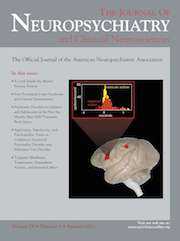Experience With Intramuscular Zuclopenthixol and Medroxyprogesterone Acetate in the Treatment of Agitation and Aggression in Huntington’s Disease
To the Editor: We present the case of a 58-year-old man with Huntington’s disease (HD) with agitation and aggression successfully treated with intramuscular zuclopenthixol and medroxyprogesterone. Medroxyprogesterone, however, caused abdominal bloating. Intramuscular zuclopenthixol was helpful in our patient and may be useful in other HD patients who refuse oral medications.
Case Report
“Mr. A” was diagnosed with HD in 2008, and had been in long-term care since 2009 for social withdrawal, episodes of disorganization, and inability to function independently. He had taken risperidone 2 mg, citalopram 20 mg, and venlafaxine 150 mg daily for behavioral disturbances and mild upper-extremity chorea. In the 4 weeks preceding admission to our dementia unit, Mr. A refused all medications, was increasingly aggressive and demanding, frequently yelled at staff in a loud and hostile tone, and had hit a staff member. Between periods of aggression, he exclusively self-isolated in his room.
Mr. A was admitted on Jan 9th, 2012. His behavior and refusal of medications continued. Despite this, he developed rapport with one of our nurses and accepted intramuscular zuclopenthixol 150 mg q 2weeks, starting on Jan 14th, at which time his Cohen-Mansfield Agitation Inventory (CMAI) and Neuropsychiatric Inventory (NPI) scores were 78 and 74, respectively. Intramuscular medroxyprogesterone was started on Jan 19th, at 200 mg/week and increased to 400 mg/week over 2 weeks. Medroxyprogesterone was used because another 17-α-hydroxyprogesterone derivative, cyproterone, had been useful in treating agitation in dementia.1 His symptoms continued at equal intensity on Feb 12th, so zuclopenthixol was increased to 200 mg q 2weeks. By Feb 28th, he was much less agitated, was less self-isolated, less demanding, and accepted bathing, with a CMAI and NPI of 56 and 48, respectively. He tolerated zuclopenthixol without somnolence, motor difficulties, or other side effects. However, he developed fluid retention, which resolved with medroxyprogesterone discontinuation on Feb 21st. Four weeks after stopping medroxyprogesterone, agitation continued to be well-controlled, with a CMAI and NPI of 57 and 44, respectively, and Mr. A was discharged from hospital.
Discussion
We described a patient with HD who had sustained improvement of agitation and aggression with intramuscular zuclopenthixol, which was well-tolerated. Our findings are consistent with a case series of five HD patients whose agitation and other psychiatric symptoms improved with long-acting injectable risperidone.2 This finding suggests that injectable antipsychotics may be helpful in HD patients with agitation and aggression, who frequently become noncompliant with oral medications.2
Although medroxyprogesterone use has not yet been reported in HD patients, there is evidence that cyproterone may be effective for agitation in dementia.1 However, in our case, medroxyprogesterone caused abdominal bloating, and its withdrawal did not lead to a relapse of symptoms.
We suggest that clinicians consider intramuscular antipsychotics when treating HD patients noncompliant to oral medications. This strategy may also be beneficial in treating chorea.2 Future studies will be needed to confirm our findings and to verify whether the metabolic and mortality risks of antipsychotic use in dementia3 also apply to HD patients.
1 : Cyproterone to treat aggressivity in dementia: a clinical case and systematic review. J Psychopharmacol 2011; 25:141–145Crossref, Medline, Google Scholar
2 : Risperidone long-acting injection and Huntington’s disease: case series with significant psychiatric and behavioural symptoms. Int Clin Psychopharmacol 2011; 26:114–119Crossref, Medline, Google Scholar
3 : Risk of mortality among individual antipsychotics in patients with dementia. Am J Psychiatry 2012; 169:71–79Crossref, Medline, Google Scholar



